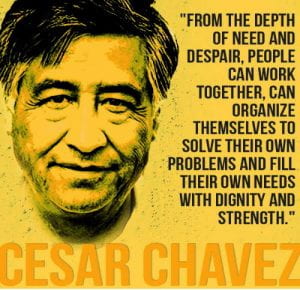 From an interview with César Chávez (Fellowship, the magazine of the Fellowship of Reconciliation, September 1973), interviewed by Fellowship editor Jim Forest:
From an interview with César Chávez (Fellowship, the magazine of the Fellowship of Reconciliation, September 1973), interviewed by Fellowship editor Jim Forest:
CHAVEZ: Nonviolence is very difficult… We’re always at the beginning point… We now have ten thousand people on strike in seven different places and in almost every single case — with 98 percent of the people — they’ve never had the experience. That’s difficult. You have to deal with them in such a way that you don’t impose the idea of nonviolence on them but that they accept it….
We’re fortunate. We’ve been able to hang on to nonviolence in these really large confrontations we’ve been having…. The thing going for us is that people are willing to sacrifice themselves. When you have that spirit, then nonviolence is not very difficult to accomplish.
FOREST: Cesar, it has been eleven years since you began organizing the farmworkers. Have there been times when your convictions about nonviolence were shaken?
CHAVEZ: No. Because I am an extremely practical man. I don’t think any one event, or any one day, or any one action, or any one confrontation wins or loses a battle. You keep that in mind and be practical about it. It’s foolish then to gamble everything on one roll of dice — which is what violence really gets down to. I think the practical person has a better chance of dealing with nonviolence than people who tend to be dreamers or who are impractical. We’re not nonviolent because we want to save our souls. We’re nonviolent because we want to get some social justice for the workers.
FOREST: You mentioned that the workers are sustained by a tradition of sacrifice. What sustains you?
CHAVEZ: People. I have to touch people, and I have to get so close to them that my skin rubs with them. That’s where I get my strength. I”m at least experienced enough to know that all power comes from the people.
FOREST: I noticed in your office many of Gandhi’s books as well as a drawing of him. There was a photo of Martin Luther King. There were various editions of the Bible. To what extent do you find yourself turning to these sources?
CHAVEZ: Well, number one, in our movement most of us are the action type and not the philosopher type…. The philosophy is great, but you take Gandhi and King and learn from them because they were activists and strategists.
FOREST: You make me think of a phrase I heard in Berkeley the other day — “cheap pacifism.” The phrase was meant to describe the stance of people who use the highly moral rhetoric of nonviolence while in reality excusing themselves from any real response to human suffering…
CHAVEZ: That’s not nonviolence! There is no reason to be nonviolent — there’s no challenge — unless you are living for the people. These two men — Gandhi and King — did it for the masses, for the people. That’s how it has to be done — for a purpose. It’s amazing how people lose track of basics. Gandhi was one of the best fund-raisers the world has ever seen! (Laughter) …When you put that together with Gandhi’s political acumen — well, you find he’s a living, operating guy working with people. …I get continually irritated by people who walk around as if they were on eggshells. I don’t buy that. I resent it. I can’t stand it. Nonviolent people aren’t part angel. “Let the world go to hell over there”– that’s what that says to me.
FOREST: You draw a distinction between saint and angel. For you, the saint isn’t an eggshell walker?
CHAVEZ: You know, Gandhi’s secretary was once asked by some Westerners who came idolizing Gandhi, “Oh, how is it to live with Gandhi?” And his secretary says: “To live with Gandhi is like living in the mouth of a lion.” (Burst of laughter.)
FOREST: I recall Gandhi saying that there are so many hungry people in the world that the only way God can appear is as a piece of bread.
CHAVEZ: Right. You know, if people are not pacifists, it’s not their fault. It’s because society puts them in that spot. You’ve got to change it. You don’t just change a man — you’ve got to change his environment as you do it.
See below the telegram sent by Dr. Martin Luther King, Jr. to César Chávez following his 25-day fast for nonviolence in February-March 1968, just a few weeks before Dr. King’s assassination:
